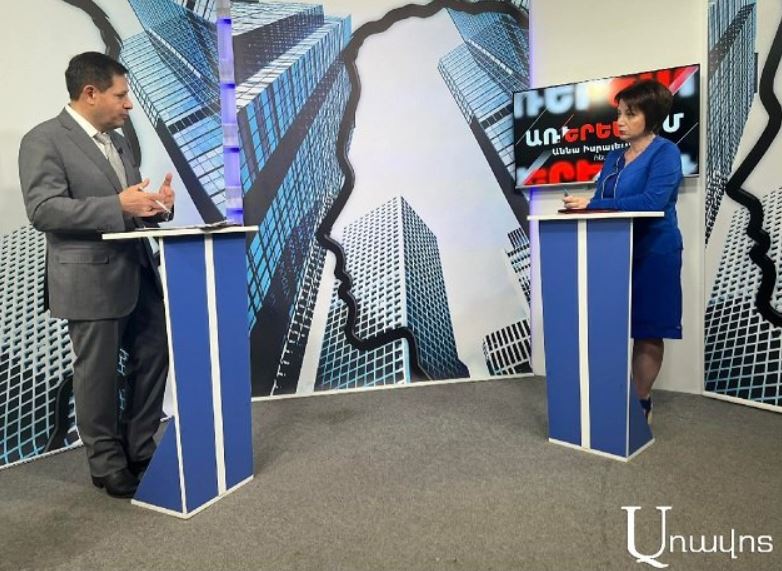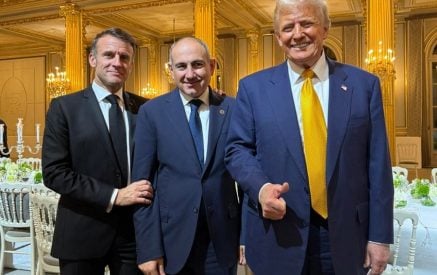The guest of Aravot’s “Areresum (Confrontation)” program, the former Deputy Ambassador of Armenia to the USA and lawyer Armen Kharazyan, is a supporter of withdrawing from the Collective Security Treaty Organization (CSTO) and receiving military assistance from the USA. Therefore, in our conversation with him, we mainly cited the counter-arguments presented by those advising Armenia to refrain from such a sharp turn. First, there is a counter-argument that leaving the CSTO will cause no less security risks for us.
Armen Kharazyan mentioned in this regard, “In both cases, there are risks with exiting or not exiting the CSTO. The risk of not leaving can sometimes be expressed by the loss of Armenian control over the sovereign territory of Armenia.”
In response to the comment, also by the loss of Artsakh, he said, “To be honest, it is difficult for me to consider the loss of Artsakh final and irreversible.” In response to the assumption that leaving the CSTO will definitely make the loss of Artsakh final, he mentioned, “It is difficult to say because CSTO itself is a dysfunctional mechanism. It is launched only by Russia’s desire and political will. And I haven’t seen any logical case of launching the CSTO, except for the recent incident in Kazakhstan, which raises many questions about rationality.
The CSTO has generally been a Russian propaganda framework to show the West that in response to NATO, Russia can bring countries around it. The other counter-argument is that the Armenian soldier today defends Armenia with weapons given by Russia, not NATO. We know that Armenia does not receive weapons from NATO. And if it receives any weapons from Russia, we have seen that it does not provide a solution to the problems facing RA,” said Mr. Kharazyan. He also responded to another counter-argument that Armenia’s threat is Azerbaijan and Turkey, and the latter is a member of NATO, not CSTO.
Read also
Agreeing that the threats facing Armenia stem from those two countries, the former deputy ambassador of Armenia to the USA said. “However, Armenia also faces a threat from Russia to Armenian statehood… Russia perceives the independence of any country around its borders as a challenge to its integrity and its position in the international arena. And seeks to suppress the independence of that country. We see its manifestations in the Baltic states, today in Ukraine, etc.”
There is also a point of view voiced by Dr. Artur Khachikyan of Stanford University’s International Relations, emphasizing that it is pointless for Armenia to make requests to various international structures and wait for anything other than toothless statements in order to defend against Azerbaijan’s attacks because it is obvious that if these international structures wanted to help Armenia or Artsakh, then they would do at least one percent of what they did for Ukraine. “I don’t agree at all,” said the former Deputy Ambassador of Armenia to the United States.
“The international assistance given to Ukraine today comes especially from NATO, the United States, and other countries, because Ukraine is fighting for its independence and territorial integrity.” Armen Kharazyan specifically responded to the objection that this assistance is given because the fight is against Russia. “Fighting against Russia is a much more difficult task than fighting against Azerbaijan. And if Armenia wanted to fight against Azerbaijan, having the most modern weapons, Armenia could ask for those weapons and receive them if the requirements for receiving the weapons are met. Those requirements are actually a number of legal and regulatory issues, for the solution of which Armenia is obliged to take steps.”
When asked how it is that the international community welcomed the Armenian-Azerbaijani and Armenian-Turkish dialogue and efforts towards regional peace, but Aliyev dared to start another military operation in front of the eyes of the world, our interlocutor answered, “Azerbaijan is carrying out this operation with the obvious tolerance of Russia, and I would also say, perhaps with its permission and encouragement. There is a mutual understanding between Azerbaijan, Russia and Turkey about the goals of this operation.”
And whether what happened was a failure of the policy of the current government, or whether the participation of the USA, France, and the EU guarantees the political security of Armenia, he answered, “Armenia has not even had a serious conversation with these countries about the participation of these countries. Armenia does not want any other kind of military presence in this region besides Russia. And it does not want to see any other kind of leadership besides Russian leadership.”
Anna ISRAELYAN























































